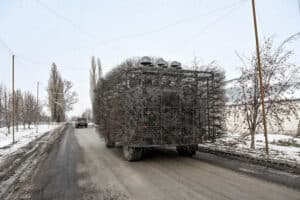However, Russia stressed it would continue to move troops across the country as it saw fit.

Russia said Tuesday it was pulling back some of its forces near the Ukrainian border to their bases, in what would be the first major step towards de-escalation in weeks of crisis with the West.
The move came amid an intense diplomatic effort to avert a feared Russian invasion of its pro-Western neighbour and after Moscow amassed more than 100,000 troops near Ukraine’s borders.
The Kremlin said that the pullback of some forces from Ukraine’s borders was planned but stressed Russia would continue to move around troops across the country as it saw fit.
“We have always said that after the exercises are over … troops would return to their permanent bases. There’s nothing new here. This is a usual process,” Kremlin spokesman Dmitry Peskov told reporters.
German Chancellor Olaf Scholz was set to be the latest European leader to meet Russian President Vladimir Putin on Tuesday, with talks due later in Moscow.
The crisis — the worst between Russia and the West since the end of the Cold War — reached a peak this week, with US officials warning that a full-scale invasion, including an assault on the Ukranian capital Kyiv, was possible within days.
This video is no longer available.
On Tuesday morning, the Russian defence ministry spokesman said some forces deployed near Ukraine had completed their exercises and were packing up to leave.
“Units of the southern and western military districts, having completed their tasks, have already begun loading onto rail and road transport and today they will begin moving to their military garrisons,” the ministry’s chief spokesman, Igor Konashenkov, said in a statement.
– ‘Large-scale’ exercises continue –
It was not immediately clear how many units were involved and what impact the withdrawals would have on the overall number of troops surrounding Ukraine, but it was the first announcement of a Russian drawdown in weeks.
Konashenkov said “large-scale” Russian military drills were continuing in many areas, including joint exercises in Belarus and naval exercises in the Black Sea and elsewhere.
If Western officials confirm that Moscow is taking steps to reduce its forces, it would help ease fears of a major war in Europe that have been rising for weeks.
Russian Foreign Ministry spokeswoman Maria Zakharova suggested Tuesday’s news would show it was the West that had been raising tensions with its accusations of an invasion plan.
“February 15, 2022, will go down in history as the day Western war propaganda failed. Humiliated and destroyed without a single shot being fired,” she wrote on social media.
Comments from Putin’s foreign and defence ministers on Monday had already offered some hope of a de-escalation.
During a carefully choreographed meeting Monday with Putin, Foreign Minister Sergei Lavrov said “there is always a chance” of reaching an agreement with the West over Ukraine.
He told Putin that exchanges with leaders in European capitals and Washington showed enough of an opening for progress on Russia’s goals to be worth pursuing.
Defence Minister Sergei Shoigu meanwhile told Putin that some Russian military drills launched in December were “ending” and more would end “in the near future”.
Ukraine said Tuesday that it appeared that Kyiv and the West had been able to deter an invasion.
“We and our allies have managed to prevent Russia from any further escalation,” Foreign Minister Dmytro Kuleba told reporters on Tuesday, though he added a note of caution.
“We have a rule: don’t believe what you hear, believe what you see. When we see a withdrawal, we will believe in a de-escalation,” he said.
This video is no longer available.
– ‘Crucial window’ still open –
Scholz was to meet Putin a day after talks with Ukrainian President Volodymyr Zelensky in Kyiv, where the German leader urged Moscow “to take up the existing offers of dialogue”.
Support from Germany, a major economic partner for Moscow and importer of Russian gas, is crucial for the package of crippling sanctions that Western leaders say would be imposed in response to an invasion.
Ahead of Tuesday’s talks, German Foreign Minister Annalena Baerbock warned that “the situation is particularly dangerous and can escalate at any moment”.
“The responsibility for de-escalation is clearly with Russia, and it is for Moscow to withdraw its troops,” she said in a statement.
Moscow has repeatedly blamed the crisis on the West, saying the United States and western Europe are ignoring Moscow’s legitimate security concerns.
The Kremlin insists NATO must give assurances Ukraine will never be admitted as a member and roll back its presence in eastern European countries.
Russia already controls the Crimean Peninsula that it seized from Ukraine in 2014 and supports separatist forces who have taken control of parts of eastern Ukraine, in a conflict that has claimed more than 14,000 lives.
US President Joe Biden and British Prime Minister Boris Johnson agreed in a call late Monday that “a crucial window for diplomacy” remained.
“The leaders emphasised that any further incursion into Ukraine would result in a protracted crisis for Russia, with far-reaching damage for both Russia and the world,” a Downing Street spokesman said.
Amid some claims from US officials that an invasion was being prepared for Wednesday, Zelensky declared it a “Unity Day”, urging Ukrainians to take the streets in peaceful demonstrations of solidarity.
by Michael MAINVILLE with Dmitry ZAKS in Kyiv
Support Local Journalism
Add The Citizen as a Preferred Source on Google and follow us on Google News to see more of our trusted reporting in Google News and Top Stories.






